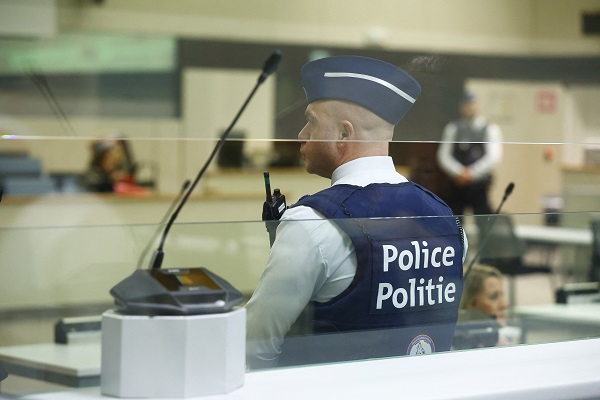 A police officer stands in the courtroom prior to the selection of the jury for the 2016 Brussels and Maelbeek attacks trial at the Justitia building in Brussels, Belgium, 30 November 2022;
Credit: Stephanie Lecocq / Pool via Reuters
A police officer stands in the courtroom prior to the selection of the jury for the 2016 Brussels and Maelbeek attacks trial at the Justitia building in Brussels, Belgium, 30 November 2022;
Credit: Stephanie Lecocq / Pool via Reuters
BRUSSELS (Reuters) - Belgium launches its largest ever trial on Wednesday 30 November 2022 to determine whether ten accused men played a part in the 2016 Islamist bombings of Brussels airport and the city's metro that killed 32 people and injured more than 300.
Among the ten accused are six men already convicted in France over the November 2015 Paris attacks, but unlike the French trial which concluded in June with a decision by a panel of judges, the Brussels case will be settled by a jury.
Presiding Judge Laurence Massart will oversee the selection of a twelve-person panel, chosen from 1,000 Belgian citizens summoned to attend a mammoth selection process on Wednesday.
Proceedings will commence on Monday 5 December 2022 in the former headquarters of NATO in a Brussels suburb.
The trial, set to last until the end of June, will undoubtedly revive painful memories for the roughly 1,000 victims registered to attend. They include those who lost loved ones or were injured and witnesses to the twin bombings at the airport and third bomb on the metro on 22 March 2016.
Lawyers say many are seeking to understand why they or their loved ones became targets of an Islamist attack.
Certain relatives and victims are expected to address the court, along with a roster of some 370 experts and witnesses due to testify.
The defendants include Mohamed Abrini, who prosecutors say went to Brussels Airport in March 2016 with two suicide bombers, but fled without detonating his suitcase of explosives, and Osama Krayem, a Swedish national accused of planning to be a second bomber on Brussels' metro.
Salah Abdeslam, the main suspect in the French trial who was seized four days before the Brussels attacks, is also among the accused, along with others prosecutors say hosted or helped certain attackers. One of the ten, presumed killed in Syria, will be tried in absentia.
The trial, estimated including building conversion to cost €20-25 million was to have started in October, but was delayed after the judge ordered reworking of the glass boxes for the defendants that their lawyers likened to animal cages.








